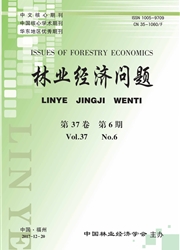

 中文摘要:
中文摘要:
论文从旅游者环境意识、感知质量、旅游感知利得、旅游感知利失、旅游环境友好度5个结构变量出发,通过引入感知质量作为中介变量,构建环境意识对旅游环境行为友好度影响机制的理论框架。并以青海湖景区为实证研究对象,通过验证性因子分析和三阶段结构方程模型的定量分析,校验理论框架中各结构因子、结构因子与其所含维度之间的影响路径及其系数,定量测度旅游者感知质量在环境意识与旅游感知价值关联中的中介效用和影响机制,及对旅游环境行为的潜在影响模式。结果表明:(1)环境意识对旅游者在旅游中的感知利益得失的影响方式存在差异,环境意识对感知利得的作用大于对感知利失的作用。(2)旅游者的感知利得有助于环境友好行为的产生,感知利失会对旅游环境行为友好度产生消极影响。(3)感知质量的中介效用存在且有效,旅游者环境意识通过感知质量,强化了对旅游感知价值及环境友好行为的作用。(4)感知质量分别在感知利得与感知利失结构模型中的中介效用存在强弱,在感知利得结构模型的中介作用强于感知利失模型。
 英文摘要:
英文摘要:
This paper examines the influence environmental awareness and recreation experience has on the environmentally-friendly behavior of tourists, and identifies the function of perceived quality as an intermediary variable. By providing a conceptual framework based on the combination of environmental awareness theory and tourist perception theory, and a SEM-based methodology, an in-depth analysis of the influence mechanism was carried out in the Qinghai Lake area of Qinghai province. Results show that there exist differences in the ways environmental awareness influences perceived gains and perceived losses, and the influence coefficient of the former is higher than that of the latter. The perceived gains may promote environmentally friendly behaviors, while the perceived losses have an adverse impact on such behaviors. Moreover, the strength of the adverse impact of the latter is less than the strength of the positive impact of the former. The mediating effect of perceived quality was confirmed in the EA(environmental awareness)-EB(environmental behavior) nexus, within which the influence of tourist environmental awareness on environmentally friendly behavior could be transformed. The mediating effect of perceived quality in the perceived-gains model was more obvious than that in the perceived-losses model. This study highlights the importance of understanding the foundations of environmental behavior related to environmental awareness and tourist perceptions.
 同期刊论文项目
同期刊论文项目
 同项目期刊论文
同项目期刊论文
 期刊信息
期刊信息
